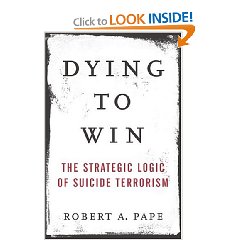The University of Chicago is an extraordinary institution–the author, employed there, lives up to their reputation for methodical, scholarly, useful reflections grounded firmly in the facts. This work significantly advances our understanding of terrorism and of the three forms of suicidal terrorism: egotistic, altruistic, and fatalistic. The author documents his findings that most suicidal terrorists are altruistic, well-educated, nationalistically-motivated, and fully witting and dedicated to their fatal mission as a service to their community.
Of the 563 books I have reviewed–all in national security and global issues, and all but four among the best books in the field–this new work by Professor Pape stands out as startlingly original, thoughtful, useful, and directly relevant to the clear and present danger facing America: an epidemic of suicidal terrorism spawned by the “virtual colonialism” of the US in Saudi Arabia, Egypt, and now Iraq as well as other countries.
I will not repeat the excellent listing of facts in the Book Description provided by the publisher–certainly that description should be read carefully. If you are a Jewish zealot, don't bother, you will not get over the cognitive dissonance. Everyone else, including Muslim, Protestant, and Catholic contributors to Congressional and Presidential campaign funds, absolutely must read this book.
There are many other books that support the author's key premises, all well-documented with case studies and the most complete and compelling statistics–known facts. I am persuaded by the author's big three:
1) Suicidal terrorism correlates best with U.S. military occupation of specific countries that tend to be undemocratic and corrupt, where the U.S. in collusion with dictators and one-party elites are frustrating legitimate national aspirations of the larger underclass and middle class;
2) Virtually all of the suicidal terrorists comes from allies of the U.S. (at least nominally–they actually play the U.S. as “useful idiots”) such as Saudi Arabia, rather than Iran;
3) The three premises shared by Hezbollah, Hamas, Al Qaeda, the Tamil Tigers, and now the Iraqi insurgency, are all accurate and will continue to be so if the U.S. does not pull its military out of the Middle East, Pakistan, Indonesia, and other locations:
a) Occupation of Iraq and Afghanistan, and virtual colonialism everywhere else, demand martyrdom operations;
b) Conventional inferiority mandates self-sacrifice (not only suicidal terrorism, but other asymmetric attacks including the death of a thousand cuts against key energy, water, and transportation nodes in the USA; and
c) The US and its European allies are vulnerable to coercive pressure. The withdrawal of the Americans and the French from Viet-Nam and then Lebanon, of the Israelis from the West Bank, and other concessions itemized by the author, have all made the case for suicidal terrorism. It works and it will explode.
I will mention several other books to support this author, but wish to stress that alone, his work is spectacularly successful in documenting the fallacies of the U.S. national security policy.
Among the books that support him are
Imperial Hubris: Why the West Is Losing the War on Terror
The Search for Security: A U.S. Grand Strategy for the Twenty-First Century
Rogue Nation: American Unilateralism and the Failure of Good Intentions
The Fifty-Year Wound: How America's Cold War Victory Has Shaped Our World
The Sorrows of Empire: Militarism, Secrecy, and the End of the Republic (The American Empire Project)
Tactics of the Crescent Moon: Militant Muslim Combat Methods
Understanding Terror Networks
The Global Class War: How America's Bipartisan Elite Lost Our Future – and What It Will Take to Win It Back
The Unconquerable World: Power, Nonviolence, and the Will of the People
This is a core reading for every officer at STRATCOM and SOCOM, and for anyone who wishes to be effective at either Public Diplomacy or Strategic Communication or Information Operations. This author should be an invited distinguished funded speaker at every single war college in the Western democracies. We cannot win without listening to him. Military withdrawals, combined with energy independence, are essential. Without them, we not only will not fully defeat the current crop of suicidal terrorists, but we will, in attempting to deal with the current threat with old counter-productive and heavy-handed means, give birth to hundreds of thousands in the next generation of suicidal terrorists.
There are not enough guns in the world to win this one, even if we had competent intelligence at the neighborhood level, which we do not. In keeping with the author's recommendations, it is clear that moral capitalism, informed democracy, equanimity toward bottom up movements for national liberation and an end to corruption, an honest policy process in Washington, D.C.–these are the keys to victory.
This is a towering accomplishment and a major contribution to strategic thinking.





